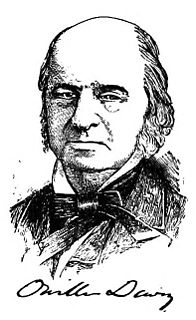A Quote by Arthur Schopenhauer
There is not a grain of dust, not an atom that can become nothing, yet man believes that death is the annhilation of his being.
Related Quotes
The divine life is the spirit in everything that exists, from the atom to the archangel; the grain of dust could not be were God absent from it; the loftiest seraph is but a spark from the eternal fire, which is God. Sharers in one life all form one brotherhood. The immanence of God, the solidarity of man, such are the basic truths of theosophy.
Man is slightly nearer to the atom than to the star. ... From his central position man can survey the grandest works of Nature with the astronomer, or the minutest works with the physicist. ... [K]nowledge of the stars leads through the atom; and important knowledge of the atom has been reached through the stars.
Dying was nothing and he had no picture of it nor fear of it in his mind. But living was a field of grain blowing in the wind on the side of a hill. Living was a hawk in the sky. Living was an earthen jar of water in the dust of the threshing with the grain flailed out and the chaff blowing. Living was a horse between your legs and a carbine under one leg and a hill and a valley and a stream with trees along it and the far side of the valley and the hills beyond.
[He] looked up and imagined the hand of God flinging stars like shining dust across the heavens. No. He was wrong to think such pagan thoughts, for God had only to utter a word and it was done. Only man had He shaped with His hands, using the dust He created to form His most precious and amazing creation. Only man was molded and loved into being, the breath of life in his lungs given by God.
The Master gives himself up to whatever the moment brings. He knows that he is going to die, and her has nothing left to hold on to: no illusions in his mind, no resistances in his body. He doesn't think about his actions; they flow from the core of his being. He holds nothing back from life; therefore he is ready for death, as a man is ready for sleep after a good day's work.
Joy, anger, sorrow, happiness, find no place in that man's breast; for to him all creation is ONE. And all things being thus united in ONE, his body and limbs are but as dust of the earth, and life and death, beginning, and end, are but as night and day, and cannot destroy his peace. How much less such trifles as gain or loss, misfortune or good fortune?
Human stories are practically always about one thing, really, aren't they? Death. The inevitability of death. . . . . . (quoting an obituary) 'There is no such thing as a natural death. Nothing that ever happens to man is natural, since his presence calls the whole world into question. All men must die, but for every man his death is an accident, and even if he knows it he would sense to it an unjustifiable violation.' Well, you may agree with the words or not, but those are the key spring of The Lord Of The Rings
Who can break the law? If I break this glass, it will fall down. If anyone succeeds in throwing one atom out of place, every other atom will go out of balance. . . . The law can never be broken. Each atom is kept in its place. Each is weighed and measured and fulfils its [purpose] and place. Through His command the winds blow, the sun shines. Through His rule the worlds are kept in place. Through His orders death is sporting upon the earth. Just think of two or three Gods having a wrestling match in this world! It cannot be.
Time is a lot of the things people say that God is. There's always preexisting, and having no end. There's the notion of being all powerful-because nothing can stand against time, can it? Not mountains, not armies. And time is, of course, all-healing. Give anything enough time, and everything is taken care of: all pain encompassed, all hardship erased, all loss subsumed. Ashes to ashes, dust to dust. Remember, man, that thou art dust; and unto dust thou shalt return. And if time is anything akin to God, I suppose that memory must be the devil.
[N]either in war nor yet at law ought any man to use every way of escaping death. For often in battle there is no doubt that if a man will throw away his arms, and fall on his knees before his pursuers, he may escape death; and in other dangers there are other ways of escaping death, if a man is willing to say and do anything. The difficulty, my friends, is not in avoiding death, but in avoiding unrighteousness; for that runs faster than death.
The religious man, the mystic, tries to explore the mystery of death. In exploring the mystery of death, he inevitably comes to know what life is, what love is. Those are not his goals. His goal is to penetrate death, because there seems to be nothing more mysterious than death. Love has some mystery because of death, and life also has some mystery because of death.









































